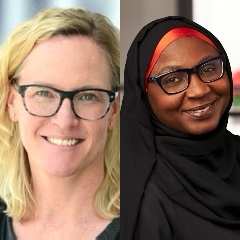MacArthur Foundation Promotes Gender Equity And Social Inclusion In Nigeria
The foundation has expressed eagerness to strengthen the capacity of its partners in the West African sub-region to promote equitable opportunities, especially for women.

MacArthur Foundation has shared its working process with its grantees towards ensuring Gender Equity and Social Inclusion (GESI) in Nigeria.
In a statement published on its website on Tuesday, Sept. 27, the foundation explained how it plans to ensure that GESI becomes an important aspect of its program in Nigeria.
MacArthur describes GESI as including “the intersections of various dimensions of identity, gender, ability, generation, geography, and ethnicity.”
The global foundation, which seeks to reduce corruption in Nigeria and promote transparency, accountability, and participation, has noted that the inclusion of gender equity and social inclusion is an important aspect of its anti-corruption campaign and must now be focused upon.
What the foundation intends to do with the GESI topic is to speak to the effect of Nigeria’s corruption problem on marginalized groups (“especially women”) and to ensure that Nigerians enjoy “equitable opportunities.”
A lot of MacArthur grantees have before now incorporated GESI into their work. However, because it needs to ensure that this incorporation is strengthened and deepened, the foundation organized a workshop with two-thirds of its grantees, where it discussed the methods that would enhance GESI in all of its programs.
According to Dr Amina Salihu and Chantell Johnson of MacArthur, what the foundation intends to do as part of its “learning and next step” is to reflect on how it “can be more intentional” with GESI and how it can support the efforts of its grantees to do the same.
The foundation said that it discovered during this process that many of its grantees agree that GESI is an essential aspect of their collective work, which “needs to proactively include women, youth, and people with disabilities in programming.”
It also found that many of its grantees not only actively include marginalized people in its programs but have also discovered on their own that women, youths, and people with disabilities suffer the most from the problem of bad governance in Nigeria.
Based on this premise, half of its grantees have shown enthusiasm toward more workshops and training that would “further operationalize GESI in their operations and the field.” Following this outcome, the organisation has said that it is willing to work and learn with its grantees as it concerns the issue of GESI.
In addition, the foundation said it is working with its grantees to work out methods that would “strengthen and socialize GESI frameworks through training and convenings.”
MacArthur has been present in Nigeria since 1994. In all those years, it has supported grantees in their efforts to fight corruption and promote accountability, transparency, and participation in the country.
Support Our Journalism
There are millions of ordinary people affected by conflict in Africa whose stories are missing in the mainstream media. HumAngle is determined to tell those challenging and under-reported stories, hoping that the people impacted by these conflicts will find the safety and security they deserve.
To ensure that we continue to provide public service coverage, we have a small favour to ask you. We want you to be part of our journalistic endeavour by contributing a token to us.
Your donation will further promote a robust, free, and independent media.
Donate HereStay Closer To The Stories That Matter




